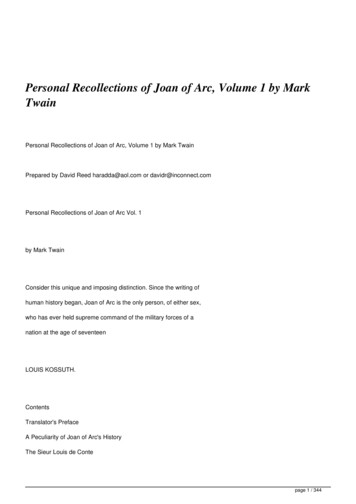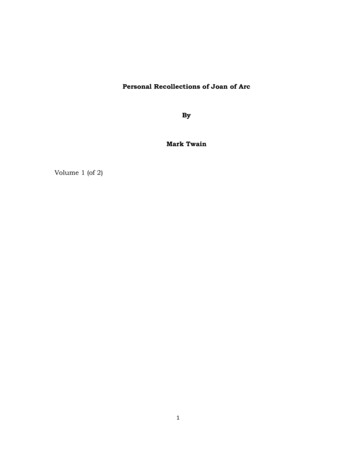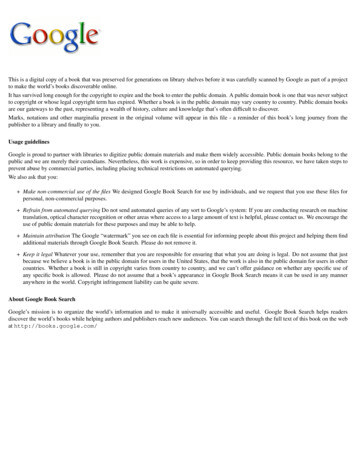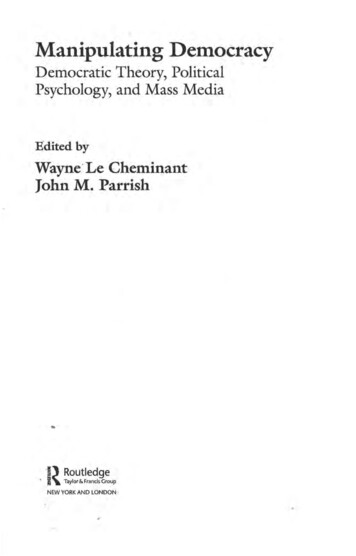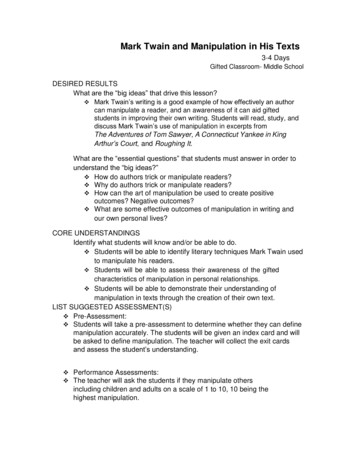
Transcription
Mark Twain and Manipulation in His Texts3-4 DaysGifted Classroom- Middle SchoolDESIRED RESULTSWhat are the “big ideas” that drive this lesson? Mark Twain’s writing is a good example of how effectively an authorcan manipulate a reader, and an awareness of it can aid giftedstudents in improving their own writing. Students will read, study, anddiscuss Mark Twain’s use of manipulation in excerpts from The Adventures of Tom Sawyer, A Connecticut Yankee in KingArthur’s Court, and Roughing It. What are the “essential questions” that students must answer in order tounderstand the “big ideas?” How do authors trick or manipulate readers? Why do authors trick or manipulate readers? How can the art of manipulation be used to create positiveoutcomes? Negative outcomes? What are some effective outcomes of manipulation in writing andour own personal lives? CORE UNDERSTANDINGSIdentify what students will know and/or be able to do. Students will be able to identify literary techniques Mark Twain usedto manipulate his readers. Students will be able to assess their awareness of the giftedcharacteristics of manipulation in personal relationships. Students will be able to demonstrate their understanding of manipulation in texts through the creation of their own text.LIST SUGGESTED ASSESSMENT(S) Pre-Assessment: Students will take a pre-assessment to determine whether they can definemanipulation accurately. The students will be given an index card and willbe asked to define manipulation. The teacher will collect the exit cardsand assess the student’s understanding. Performance Assessments: The teacher will ask the students if they manipulate othersincluding children and adults on a scale of 1 to 10, 10 being thehighest manipulation.
The teacher will circulate throughout the classroom to determine if thestudents are accurately highlighting the correct sections of Twain’sshort stories, excerpts from novels, and hoaxes. Students will participate and contribute accurate and appropriateinformation during the class discussion after the reading of thetwo hoaxes. Students will be able to accurately locate passages that contain evidenceof manipulation in an excerpt from Mark Twain. Students will be able to self-reflect and openly share incidents in their livesin which they have manipulated other people. The students will completethe self-reflection handout honestly and understand that manipulation canhave positive and negative outcomes. LEARNING EXPERIENCES AND “COMMON CORE” CONNECTIONSWhat are the specific activities and sequence of instruction that willbe used to engage students in this lesson?Procedure:1. Students will take a pre-assessment to find out their prior knowledgeabout the definition of the word “manipulation”. The teacher will handstudents an index card and have them write his or her name at the topand then write the word “manipulation” below their name. The studentswill write the definition of the word and hand it to the teacher. Theteacher will be able to see how much prior knowledge the studentshave in regards to “manipulation” and plan instruction accordingly.2. Students will be given a copy of the definitions of “manipulation” (seehandout). Students will read the definitions and teacher will clarify anyquestions or misunderstandings in reference to the handout.3. The teacher will point out that Mark Twain has developed a scenefocusing on Tom’s ability to manipulate the neighborhood boys tocomplete Tom’s work of whitewashing the fence and making the boysthink that it was play. He also manipulated the boys to giving him smalltrinkets so the boys could whitewash the fence. Tom Sawyer, likeClemens, avoids work at all costs. Explain to the students that you aregoing to give them an excerpt from the novel The Adventures of TomSawyer (see handouts). There are two copies of the excerpt. One is ateacher resource with the manipulation lines underlined and the otheris a student copy. This is a famous scene from the novel. Have thechildren read the excerpt and highlight the examples of manipulation.The students should come to the conclusion that this particularpassage is filled with many examples of manipulation. Meet with apartner and share what lines were highlighted and discuss anydifferences. As the students are sharing, walk around room andassess which students are understanding and not understanding.
4.5.6.7.Then have students share with whole group and construct a list ofexamples to be displayed in the classroom. (If time allows, youmay want the students to role play this famous scene.)The teacher should then emphasize that this lesson will help giftedstudents identify with Mark Twain’s characteristics so the students willincrease their self-awareness of manipulating others, especially adults.The students need to know that this is not respectful and that giftedstudents may be prone to do this. The students should alsounderstand that there are times when writers use manipulation to playwith their audiences and develop more complex characters, plots, andthemes. In this case the use of manipulation can have positive effects.The students need to differentiate between the positive and negativeuses of manipulation.Ask them to complete a plus/delta chart in reference to the positiveand negative uses of manipulation (see handout). Students keep thishandout for tomorrow’s lesson.Have the students read the “The Jumping Frog of CalaverasCounty”. Then ask them to complete the handout called “TheJumping Frog Debate.” This will be collected by your teacher.Remind the students that one of the objects of this lesson is to help thegifted and talented students to make connection that one of thecharacteristics of being very bright is manipulating adults and otherstudents for that matter. Explain to the gifted students that they need tothink about times Twain has manipulated the reader’s mind and/orchose to incorporate characters, plots, and themes. Ask students toget out the plus/delta chart from yesterday. Have them share some oftheir thinking about the plus/deltas in regards to manipulation. Recordstudents’ thinking on a piece of large paper. Are any conclusionsdrawn in regards to manipulation? This should open a rich discussionabout the good and bad points of manipulation.National Association of Gifted Children Program Standards: Standard 1: Development and Characteristics of Learners oEducation of gifted learners demonstrates respect for their studentsas unique human beings.o Teachers of gifted students understand variations in character traitsand development between and among individuals with and withoutneeds and capacities.
Standard 3: Individual Learning Differences o Teachers will select, adapt and use these strategies to promotechallenging learning opportunities in general and specificcurriculum to modify learning environments to enhance selfawareness and self-efficacy for individuals with gifted behaviors. Standard 5: Learning Environment and Social Interactions o Educators of the gifted actively create learning environments forindividuals with gifts and talents that foster culturalunderstanding safe and emotional well-being, positive socialinteractions, and active engagement.o Educators of the gifted shape environments to encourageindependence, motivation, and self-advocacy of individuals withgifted behaviors.MATERIALS AND ATTACHMENTS Twain reading excerpts (included) Student handouts (included) Highlighters Paper Index cards Pens, pencils SUGGESTED LESSON EXTENSIONS TO ENHANCE STUDENT LEARNINGAfter studying the hoaxes in Twain’s writing, the students can write an originalversion of a hoax, utilizing the art of manipulation and utilizing Twain’s writingas a model.Students could look at the media today and complete write ups about hoaxesbeing shown in particular movies, television shows, magazines or newspaperarticles.
Student Resource: Definitions of ManipulationDefinition for manipulation :exerting shrewd or devious influence especially for one's own advantage; "his manipulationof his friends was scandalous". More »wordnetweb.princeton.edu/perl/webwn SourceDictionary.com - Answers.com - Merriam-WebsterDefinition of manipulation by the Free Online .www.thefreedictionary.com/manipulation - Cachedma·nip·u·la·tion (m -n p y -l sh n). n. 1. a. The act or practice of manipulating. b. The state ofbeing manipulated. 2. Shrewd or devious management , .Definition of manipulation:behaviour that influences someone or controls something in a clever or dishonest wayM anipulation: Definition from Answers.comwww.answers.com › Library › Business & Finance - Cachedmanipulation n.The act or practice of manipulating. The state of being manipulated. Shrewd ordevious management, especially for one's own benefit.
NameDateRead the following selection from Mark Twain’s novel The Adventures of TomSawyer as your teacher reads it aloud. After reading the selection, highlight locations inthe stories where you find manipulation.Student Resource for Whitewashing the Fence SceneFrom Mark Twain, Tom Sawyer, Chapter Two, 1876.Saturday morning was come, and all the summerworld was bright and fresh, and brimming with life.There was a song in every heart; and if the heart wasyoung the music issued at the lips. There was cheerin every face and a spring in every step. The locusttrees were in bloom and the fragrance of theblossoms filled the air. Cardiff Hill, beyond thevillage and above it, was green with vegetation and itlay just far enough away to seem a Delectable Land,dreamy, reposeful, and inviting.Tom appeared on the sidewalk with a bucket ofwhitewash and a long-handled brush. He surveyedthe fence, and all gladness left him and a deepmelancholy settled down upon his spirit. Thirty yardsof board fence nine feet high. Life to him seemedhollow, and existence but a burden. Sighing, hedipped his brush and passed it along the topmostplank; repeated the operation; did it again; comparedthe insignificant whitewashed streak with the far reaching continent of unwhitewashed fence, and satdown on a tree -box discouraged. Jim came skippingout at the gate with a tin pail, and singing BuffaloGals. Bringing water from the town pump had alwaysbeen hateful work in Tom’s eyes, before, but now itdid not strike him so. He remembered that there wascompany at the pump. White, mulatto, and negroboys and girls were always there waiting their turns,resting, trading playthings, quarrelling, fighting,skylarking. And he remembered that although the pump Illustration from Tom SawyerCourtesy The Mark Twain House, Hartfordwas only a hundred and fifty yards off, Jim never gotback with a bucket of water under an hour –and even then somebody generally had to go after him. Tom said:“Say, Jim, I’ll fetch the water if you’ll whitewash some.”Jim shook his head and said:
“Can’t, Mars Tom. Ole missis, she tole me I got to go an’ git dis water an’ not stop foolin’ roun’ widanybody. She say she spec’ Mars Tom gwine to ax me to whitewash, an’ so she tole me go ‘long an’‘tend to my own business – she ‘lowed she’d ‘tend to de whitewashin’.”“Oh, never you mind what she said, Jim. That’s the way she always talks. Gimme the bucket – Iwon’t be gone only a a minute. She won’t ever know.”“Oh, I dasn’t, Mars Tom. Ole missis she’d take an’ tar de head off’n me. ‘Deed she would.”“She! She never licks anybody – whacks ’em over the head with her thimble – and who cares forthat, I’d like to know. She talks awful, but talk don’t hurt – anyways it don’t if she don’t cry. Jim, I’llgive you a marvel. I’ll give you a white alley!”Jim began to waver.“White alley, Jim! And it’s a bully taw.”“My! Dat’s a mighty gay marvel, I tell you! But Mars Tom I’s powerful ‘fraid ole missis – ”“And besides, if you will I’ll show you my sore toe.”Jim was only human – this attraction was too much for him. He put down his pail, took the whitealley, and bent over the toe with absorbing interest while the bandage was being unwound. Inanother moment he was flying down the street with his pail and a tingling rear, Tom waswhitewashing with vigor, and Aunt Polly was retiring from the field with a slipper in her hand andtriumph in her eye. But Tom’s energy did not last. He began to think of the fun he had planned forthis day, and his sorrows multiplied. Soon the free boys would come tripping along on all sorts ofdelicious expeditions, and they would make a world of fun of him for having to work – the verythought of it burnt him like fire. He got out his worldly wealth and examined it – bits of toys,marbles, and trash; enough to buy an exchange of work, maybe, but not half enough to buy so muchas half an hour of pure freedom. So he returned his straitened means to his pocket, and gave up theidea of trying to buy the boys. At this dark and hopeless moment an inspiration burst upon him!Nothing less than a great, magnificent inspiration.
He took up his brush and went tranquilly to work.Ben Rogers hove in sight presently – the very boy, ofall boys, whose ridicule he had been dreading. Ben’sgait was the hop-skip-and-jump – proof enough thathis heart was light and his anticipations high. He waseating an apple, and giving a long, melodious whoop,at intervals, followed by a deep-toned ding-dong dong, ding- dong- dong, for he was personating asteamboat. As he drew near, he slackened speed, tookthe middle of the street, leaned far over to star-boardand rounded to ponderously and with laboriouspomp and circumstance – for he was personating theBig Missouri, and considered himself to be drawingnine feet of water. He was boat and captain andengine-bells combined, so he had to imagine himselfstanding on his own hurricane-deck giving the ordersand executing them:“Stop her, sir! Ting -a-ling-ling!” The headwayran almost out, and he drew up slowly toward thesidewalk.“Ship up to back! Ting-a-ling-ling!” His armsstraightened and stiffened down his sides.“Set her back on the stabboard! Ting-a- lingling! Chow! ch-chow-wow! Chow!” His righthand, meantime, describing stately circles – forit was representing a forty-foot wheel.Illustration from Tom SawyerCourtesy The Mark Twain House, Hartford“Let her go back on the labboard! Ting-a-lingling! Chow-ch-chow-chow!” The left hand beganto describe circles.“Stop the stabboard! Ting-a-ling-ling! Stop thelabboard! Come ahead on the stabboard! Stop her! Let your outside turn over slow! Ting-a-ling-ling!Chow-ow-ow! Get out that head-line! Lively now! Come – out with your spring-line – what’re youabout there! Take a turn round that stump with the bight of it! Stand by that stage, now – let her go!Done with the engines, sir! Ting-a-ling-ling! Sh’t! s’h’t! sh’t!” (trying the gauge-cocks).Tom went on whitewashing – paid no attention to the steamboat. Ben stared a moment and thensaid: “Hi- yi ! You’re up a stump, ain’t you!”No answer. Tom surveyed his last touch with the eye of an artist, then he gave his brush anothergentle sweep and surveyed the result, as before. Ben ranged up alongside of him. Tom’s mouthwatered for the apple, but he stuck to his work. Ben said:“Hello, old chap, you got to work, hey?”Tom wheeled suddenly and said:“Why, it’s you, Ben! I warn’t noticing.”“Say – I’m going in a-swimming, I am. Don’t you wish you could? But of course you’d druther work –wouldn’t you? Course you would!”
Tom contemplated the boy a bit, and said:“What do you call work?”“Why, ain’t that work?”Tom resumed his whitewashing, and answered carelessly:“Well, maybe it is, and maybe it ain’t. All I know, is, it suits Tom Sawyer.”“Oh come, now, you don’t mean to let on that you like it?”The brush continued to move.“Like it? Well, I don’t see why I oughtn’t to like it. Does a boy get a chance to whitewash a fence everyday?”That put the thing in a new light. Ben stopped nibbling his apple. Tom swept his brush daintily backand forth – stepped back to note the effect – added a touch here and there – criticised the effect again– Ben watching every move and getting more and more interested, more and moreabsorbed. Presently he said:“Say, Tom, let me whitewash a little.”Tom considered, was about to consent; but he altered his mind:“No – no – I reckon it wouldn’t hardly do, Ben. You see, Aunt Polly’s awful particular about this fence– right here on the street, you know – but if it was the back fence I wouldn’t mind and she wouldn’t.Yes, she’s awful particular about this fence; it’s got to be done very careful; I reckon there ain’t oneboy in a thousand, maybe two thousand, that can do it the way it’s got to be done.”“No – is that so? Oh come, now – lemme, just try. Only just a little – I’d let you, if you was me, Tom.”“Ben, I’d like to, honest injun; but Aunt Polly – well, Jim wanted to do it, but she wouldn’t let him;Sid wanted to do it, and she wouldn’t let Sid. Now don’t you see how I’m fixed? If you was to tacklethis fence and anything was to happen to it – ”“Oh, shucks, I’ll be just as careful. Now lemme try. Say – I’ll give you the core of my apple.”“Well, here – No, Ben, now don’t. I’m afeard – ”“I’ll give you all of it!”Tom gave up the brush with reluctance in his face, but alacrity in his heart. And while the late steamer BigMissouri worked and sweated in the sun, the retired artist sat on a barrel in the shade close by, dangled hislegs, munched his apple, and planned the slaughter of more innocents. There was no lack of material; boyshappened along every little while; they came to jeer, but remained to whitewash. By the time Ben wasfagged out, Tom had traded the next chance to Billy Fisher for a kite, in good repair; and when he playedout, Johnny Miller bought in for a dead rat and a string to swing it with – and so on, and so on, hour afterhour. And when the middle of the afternoon came, from being a poor poverty-stricken boy in the morning,Tom was literally rolling in wealth. He had besides the things before mentioned, twelve marbles,part of ajews-harp, a piece of blue bottle-glass to look through, a spool cannon, a key that wouldn’t unlock anything,a fragment of chalk, a glass stopper of a decanter, a tin soldier, a couple of tadpoles, six fire-crackers, akitten with only one eye, a brass door - knob, a dog-collar – but no dog – the handle of a knife, four piecesof orange-peel, and a dilapidated
old window sash.He had had a nice, good, idle time all the while – plenty of company – and the fence had threecoats of whitewash on it! If he hadn’t run out of whitewash he would have bankrupted every boy inthe village.Tom said to himself that it was not such a hollow world, after all. He had discovered a great law ofhuman action, without knowing it – namely, that in order to make a man or a boy covet a thing, it isonly necessary to make the thing difficult to attain. If he had been a great and wise philosopher, likethe writer of this book, he would now have comprehended that Work consists of whatever a body isobliged to do, and that Play consists of whatever a body is not obliged to do. And this would help himto understand why constructing artificial flowers or performing on a tread-mill is work, while rollingten-pins or climbing Mont Blanc is only amusement. There are wealthy gentlemen in England whodrive four-horse passenger-coaches twenty or thirty miles on a daily line, in the summer, because theprivilege costs them considerable money; but if they were offered wages for the service, that wouldturn it into work and then they would resign.The boy mused awhile over the substantial change which had taken place in hisworldly circumstances, and then wended toward headquarters to report.The full transcript of The Adventures of Tom Sawyer is available from The University of Virginia.
Teacher Resource for Locations of Manipulation References inTom Sawyer:From Mark Twain, Tom Sawyer, Chapter Two, 1876.Saturday morning was come, and all the summerworld was bright and fresh, and brimming with life.There was a song in every heart; and if the heart wasyoung the music issued at the lips. There was cheerin every face and a spring in every step. The locusttrees were in bloom and the fragrance of theblossoms filled the air. Cardiff Hill, beyond thevillage and above it, was green with vegetation and itlay just far enough away to seem a Delectable Land,dreamy, reposeful, and inviting.Tom appeared on the sidewalk with a bucket ofwhitewash and a long-handled brush. He surveyedthe fence, and all gladness left him and a deepmelancholy settled down upon his spirit. Thirty yardsof board fence nine feet high. Life to him seemedhollow, and existence but a burden. Sighing, hedipped his brush and passed it along the topmostplank; repeated the operation; did it again; comparedthe insignificant whitewashed streak with the far reaching continent of unwhitewashed fence, and satdown on a tree -box discouraged. Jim came skippingout at the gate with a tin pail, and singing BuffaloGals. Bringing water from the town pump had alwaysbeen hateful work in Tom’s eyes, before, but now itdid not strike him so. He remembered that there wascompany at the pump. White, mulatto, and negroboys and girls were always there waiting their turns,resting, trading playthings, quarrelling, fighting,skylarking. And he remembered that although the pump Illustration from Tom SawyerCourtesy The Mark Twain House, Hartfordwas only a hundred and fifty yards off, Jim never gotback with a bucket of water under an hour –and even then somebody generally had to go after him. Tom said:“Say, Jim, I’ll fetch the water if you’ll whitewash some.”Jim shook his head and said:“Can’t, Mars Tom. Ole missis, she tole me I got to go an’ git dis water an’ not stop foolin’ roun’ widanybody. She say she spec’ Mars Tom gwine to ax me to whitewash, an’ so she tole me go ‘long an’‘tend to my own business – she ‘lowed she’d ‘tend to de whitewashin’.”
“Oh, never you mind what she said, Jim. That’s the way she always talks. Gimme the bucket – Iwon’t be gone only a a minute. She won’t ever know.”“Oh, I dasn’t, Mars Tom. Ole missis she’d take an’ tar de head off’n me. ‘Deed she would.”“ She! She never licks anybody – whacks ’em over the head with her thimble – and who cares forthat, I’d like to know. She talks awful, but talk don’t hurt – anyways it don’t if she don’t cry. Jim, I’llgive you a marvel. I’ll give you a white alley!”Jim began to waver.“White alley, Jim! And it’s a bully taw.”“My! Dat’s a mighty gay marvel, I tell you! But Mars Tom I’s powerful ‘fraid ole missis – ”“And besides, if you will I’ll show you my sore toe.”Jim was only human – this attraction was too much for him. He put down his pail, took the white alley, andbent over the toe with absorbing interest while the bandage was being unwound. In another moment hewas flying down the street with his pail and a tingling rear, Tom was whitewashing with vigor, and AuntPolly was retiring from the field with a slipper in her hand and triumph in her eye. But Tom’s energy didnot last. He began to think of the fun he had planned for this day, and his sorrows multiplied. Soon the freeboys would come tripping along on all sorts of delicious expeditions, and they would make a world of fun ofhim for having to work – the very thought of itburnt him like fire. He got out his worldly wealth andexamined it – bits of toys, marbles, and trash; enoughto buy an exchange of work, maybe, but not halfenough to buy so much as half an hour of purefreedom. So he returned his straitened means to hispocket, and gave up the idea of trying to buy the boys.At this dark and hopeless moment an inspirationburst upon him! Nothing less than a great,magnificent inspiration.He took up his brush and went tranquilly to work.Ben Rogers hove in sight presently – the very boy, ofall boys, whose ridicule he had been dreading. Ben’sgait was the hop-skip-and-jump – proof enough thathis heart was light and his anticipations high. He waseating an apple, and giving a long, melodious whoop,at intervals, followed by a deep-toned ding-dong dong, ding- dong- dong, for he was personating asteamboat. As he drew near, he slackened speed, tookthe middle of the street, leaned far over to star-boardand rounded to ponderously and with laboriouspomp and circumstance – for he was personating theBig Missouri, and considered himself to be drawingnine feet of water. He was boat and captain andengine-bells combined, so he had to imagine himselfstanding on his own hurricane-deck giving the ordersand executing them:“Stop her, sir! Ting -a-ling-ling!” The headwayran almost out, and he drew up slowly toward thesidewalk.Illustration from Tom SawyerCourtesy The Mark Twain House, Hartford“Ship up to back! Ting-a-ling-ling!” His armsstraightened and stiffened down his sides.
“Set her back on the stabboard! Ting-a-ling-ling! Chow! ch-chow-wow! Chow!” His righthand, meantime, describing stately circles – for it was representing a forty-foot wheel.“Let her go back on the labboard! Ting-a-ling-ling! Chow-ch-chow-chow!” The left hand began todescribe circles.“Stop the stabboard! Ting-a- ling-ling! Stop the labboard! Come ahead on the stabboard! Stop her! Let youroutside turn over slow! Ting-a-ling-ling! Chow-ow-ow! Get out that head-line! Lively now! Come– out with your spring-line – what’re you about there! Take a turn round that stump with the bight ofit! Stand by that stage, now – let her go! Done with the engines, sir! Ting-a-ling-ling! Sh’t! s’h’t! sh’t!”(trying the gauge-cocks).Tom went on whitewashing – paid no attention to the steamboat. Ben stared a moment and thensaid: “Hi- yi ! You’re up a stump, ain’t you!”No answer. Tom surveyed his last touch with the eye of an artist, then he gave his brush anothergentle sweep and surveyed the result, as before. Ben ranged up alongside of him. Tom’s mouthwatered for the apple, but he stuck to his work. Ben said:“Hello, old chap, you got to work, hey?”Tom wheeled suddenly and said:“Why, it’s you, Ben! I warn’t noticing.”“Say – I’m going in a-swimming, I am. Don’t you wish you could? But of course you’d druther work –wouldn’t you? Course you would!”Tom contemplated the boy a bit, and said:“What do you call work?”“Why, ain’t that work?”Tom resumed his whitewashing, and answered carelessly:“Well, maybe it is, and maybe it ain’t. All I know, is, it suits Tom Sawyer.”“Oh come, now, you don’t mean to let on that you like it?”The brush continued to move.“Like it? Well, I don’t see why I oughtn’t to like it. Does a boy get a chance to whitewash a fence everyday?”That put the thing in a new light. Ben stopped nibbling his apple . Tom swept his brush daintily backand forth – stepped back to note the effect – added a touch here and there – criticised the effect again– Ben watching every move and getting more and more interested, more and moreabsorbed. Presently he said:“Say, Tom, let me whitewash a little.”Tom considered, was about to consent; but he altered his mind:
“No – no – I reckon it wouldn’t hardly do, Ben. You see, Aunt Polly’s awful particular about this fence– right here on the street, you know – but if it was the back fence I wouldn’t mind and she wouldn’t.Yes, she’s awful particular about this fence; it’s got to be done very careful; I reckon there ain’t oneboy in a thousand, maybe two thousand, that can do it the way it’s got to be done.”“No – is that so? Oh come, now – lemme, just try. Only just a little – I’d let you , if you was me, Tom.”“Ben, I’d like to, honest injun; but Aunt Polly – well, Jim wanted to do it, but she wouldn’t let him;Sid wanted to do it, and she wouldn’t let Sid. Now don’t you see how I’m fixed? If you was to tacklethis fence and anything was to happen to it – ”“Oh, shucks, I’ll be just as careful. Now lemme try. Say – I’ll give you the core of my apple.”“Well, here – No, Ben, now don’t. I’m afeard – ”“I’ll give you all of it!”Tom gave up the brush with reluctance in his face, but alacrity in his heart. And while the latesteamer Big Missouri worked and sweated in the sun, the retired artist sat on a barrel in the shadeclose by, dangled his legs, munched his apple, and planned the slaughter of more innocents. Therewas no lack of material; boys happened along every little while; they came to jeer, but remained towhitewash. By the time Ben was fagged out, Tom had traded the next chance to Billy Fisher for a kite,in good repair; and when he played out, Johnny Miller bought in for a dead rat and a string to swingit with – and so on, and so on, hour after hour. And when the middle of the afternoon came, frombeing a poor poverty-stricken boy in the morning, Tom was literally rolling in wealth. He had besidesthe things before mentioned, twelve marbles,part of a jews-harp, a piece of blue bottle-glass to lookthrough, a spool cannon, a key that wouldn’t unlock anything, a fragment of chalk, a glass stopper ofa decanter, a tin soldier, a couple of tadpoles, six fire-crackers, a kitten with only one eye, a brassdoor - knob, a dog-collar – but no dog – the handle of a knife, four pieces of orange-peel, and adilapidated old window sash.He had had a nice, good, idle time all the while – plenty of company – and the fence had threecoats of whitewash on it! If he hadn’t run out of whitewash he would have bankrupted every boy inthe village.Tom said to himself that it was not such a hollow world, after all. He had discovered a great law ofhuman action, without knowing it – namely, that in order to make a man or a boy covet a thing, it isonly necessary to make the thing difficult to attain. If he had been a great and wise philosopher, likethe writer of this book, he would now have comprehended that Work consists of whatever a body isobliged to do, and that Play consists of whatever a body is not obliged to do. And this would help himto understand why constructing artificial flowers or performing on a tread-mill is work, while rollingten-pins or climbing Mont Blanc is only amusement. There are wealthy gentlemen in England whodrive four-horse passenger-coaches twenty or t
teacher resource with the manipulation lines underlined and the other is a student copy. This is a famous scene from the novel. Have the children read the excerpt and highlight the examples of manipulation. The students should come to the conclusion that this particular passage is filled with many examples of manipulation. Meet with a
